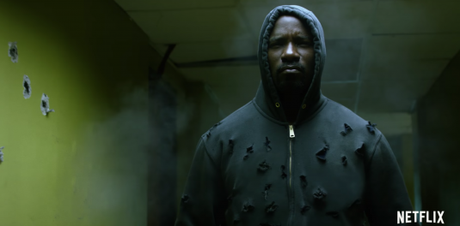
A little over a week from now the internet will be collectively obsessing over every minute detail of the entirety of Luke Cage, which is set to drop on Netflix on September 30th. You might as well prepare yourself for all of the mandatory/inevitable thinkpieces and arguments right now because whereas Jessica Jones is the show about gender Luke Cage is the show about race.
To be more specific, Luke Cage is a show about a bulletproof black man trying to clean up Harlem. Sadly, as the real world continues to remind us through one white-on-black police incident after another no black man is bulletproof. In such an environment, Luke Cage showrunner Cheo Hodari Coker felt a moral responsibility as a storyteller to draw some dramatic parallels with his show, insert social commentary without hitting viewers over the head with it. As he told SCPR's The Frame:
On Luke Cage's superhero costume being a hoodie:
Of course I wanted there to be a subtle, or in this case, not so subtle nod to what one faces as a black man in society wearing a hood. Unfortunately, what happens is that people will make assumptions about who you are based on that hoodie and that's the whole thing. I wanted to show that heroes could wear hoodies, too. I don't care what your socioeconomic status is, if you're a black man in a hoodie, you can be misinterpreted.
So that's what struck with Trayvon Martin and that's why it haunted so many African American men and women, particularly African American men that are fathers. This kid was in his own neighborhood and this kid was literally trying to get home and it wasn't even a cop. It was basically a neighborhood vigilante that killed him.
It struck so many of us because then we were like, What do I tell my kids? How do I tell you how to go about going out in this world where wearing the wrong clothes? And not even in a gang situation. Just literally the act of wearing something that makes somebody assume a stereotype puts your life in danger. That's the kind of frustration of all of it honestly.
On how Luke Cage's superpower as a bulletproof black man is relevant today:
What it means to me is kind of wish fulfillment because superheroes to a certain extent are always wish fulfillment. One could say that Captain America and Superman were reactions to WWII and fascism and what was happening in terms of having something that could symbolize American heroism to a certain extent.
I don't necessarily want to put that same mantle on Luke Cage but at the same time, it's like, so many black people that were heroes to me certainly weren't bulletproof. Not Martin Luther King. Not Malcolm X. Not Medgar Evers. Not -even on a hip-hop level - Biggie and Tupac.
So the notion of what it's like to have a hero that's bulletproof and how that would change a neighborhood and how both the police as well as villains would react to that, it has a significance that I think goes beyond just the kind of superhero/supervillain of it all.
But at the same time, that's what's so cool about the show is like it's there, but we never deal with it so specifically that you lose sight of the fact that you're watching a cool-ass superhero show.

